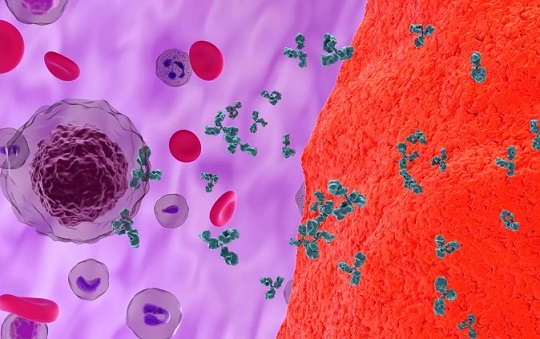Rheumatoid factors linked to rheumatoid arthritis found in some individuals after COVID-19
Nikhil Prasad Fact checked by:Thailand Medical News Team Feb 16, 2025 1 month, 3 weeks, 4 days, 10 hours, 15 minutes ago
Medical News: Scientists uncover links between COVID-19 and rheumatoid arthritis
A recent study conducted by researchers at the University of Wisconsin Madison and the William S Middleton Memorial Veterans Hospital has shed light on the potential connection between COVID-19 and rheumatoid arthritis. The findings suggest that some individuals who have recovered from COVID-19 may develop rheumatoid factors (RFs) associated with rheumatoid arthritis. While these findings do not imply that COVID-19 directly causes rheumatoid arthritis they do provide important insights into how infections might trigger changes in the immune system that could contribute to autoimmune diseases.
 Rheumatoid factors linked to rheumatoid arthritis found in some individuals after COVID-19
Rheumatoid factors linked to rheumatoid arthritis found in some individuals after COVID-19
This
Medical News report explores the findings of the study. Rheumatoid factors are antibodies that target the body's own proteins specifically the Fc region of immunoglobulin G (IgG). These RFs are commonly found in individuals with rheumatoid arthritis but can also appear in those who have had certain infections including COVID 19. The study aimed to determine whether individuals recovering from COVID 19 develop specific RFs that are typically linked to rheumatoid arthritis.
The study and methodology
The research team analyzed blood samples from three groups of individuals those recovering from COVID-19 those diagnosed with rheumatoid arthritis and healthy controls. Using enzyme linked immunosorbent assay (ELISA) tests they measured the presence of IgG IgM and IgA antibodies that bind to different forms of IgG derived peptides including their native citrulline modified and homocitrulline modified forms.
Citrulline and homocitrulline modifications are known to be involved in autoimmune responses especially in rheumatoid arthritis. In this study the scientists investigated whether individuals post COVID-19 developed RFs that specifically targeted these modified proteins. Statistical comparisons were made to assess antibody levels and determine whether certain RFs appeared more frequently in individuals who had recovered from COVID-19 compared to healthy controls.
Key findings of the study
The results showed that rheumatoid arthritis associated RFs were primarily found in individuals with rheumatoid arthritis. However, some individuals who had recovered from COVID-19 also developed moderate levels of these RFs particularly of the IgA isotype and those that reacted with homocitrulline modified IgG peptides.
More specifically the study found that:
-Increased IgG binding to citrulline and homocitrulline modified peptides was almost exclusively seen in individuals with rheumatoid arthritis.
-IgA binding was elevated in rheumatoid arthritis patients for several modified peptides and was also found in one homocitrulline containing peptide in individuals post COVID-19.
-Some individuals post COVID-19 had elevated IgG or IgA levels against two specific homocitr
ulline modified IgG peptides which were also highly reactive in rheumatoid arthritis patients.
-Traditional IgM RFs were more common in post COVID-19 individuals compared to controls but were distinct from the RFs found in rheumatoid arthritis.
These findings indicate that while rheumatoid arthritis associated RFs are primarily restricted to rheumatoid arthritis there is a subset of post COVID-19 individuals who generate moderate levels of these RFs particularly those that target homocitrulline modified proteins.
Implications for autoimmune disease research
The study's findings provide valuable insights into how infections such as COVID-19 might trigger immune responses that could contribute to the development of autoimmune diseases. While the presence of these RFs post COVID-19 does not necessarily mean that these individuals will develop rheumatoid arthritis it raises questions about whether viral infections could act as triggers for the loss of immune tolerance.
One possible explanation is that the immune system may become temporarily dysregulated following a viral infection leading to the production of autoantibodies such as RFs. In most individuals these responses might resolve over time but in some cases, they could persist and contribute to the development of autoimmune diseases.
Additionally, the study highlights the importance of monitoring individuals post COVID-19 for signs of autoimmune activity particularly those who develop RFs targeting homocitrulline modified peptides. These RFs could potentially serve as early biomarkers for identifying individuals at higher risk of developing rheumatoid arthritis in the future.
Conclusion
The research finding provide important new insights into the relationship between COVID-19 and rheumatoid arthritis associated RFs. While rheumatoid arthritis associated RFs were primarily found in individuals with the disease some individuals post COVID-19 developed moderate levels of these RFs particularly of the IgA isotype and those that reacted with homocitrulline modified proteins.
These findings refine our understanding of RFs provide novel insights into the loss of immune tolerance post infection and reveal new possibilities for biomarker development in preclinical rheumatoid arthritis. Further studies are needed to determine whether these RFs persist over time or if they are transient immune responses following viral infection.
The study findings were published in the peer reviewed journal: Frontiers in Immunology.
https://www.frontiersin.org/journals/immunology/articles/10.3389/fimmu.2025.1553540/full
For the latest COVID-19 News, keep on logging to Thailand
Medical News.
Read Also:
https://www.thailandmedical.news/news/new-hope-for-treating-sars-cov-2-virus-induced-osteoarthritis
https://www.thailandmedical.news/news/impact-of-covid-19-on-rheumatoid-arthritis-insights-from-romanian-hospitals
https://www.thailandmedical.news/news/covid-19-news-scientists-warns-of-the-impact-of-sars-cov-2-on-the-musculoskeletal-system-and-calls-for-more-research
https://www.thailandmedical.news/news/covid-19-latest-new-zealand-and-australian-study-shows-that-rheumatoid-arthritis-may-increase-risk-of-covid-19-mortality
https://www.thailandmedical.news/pages/thailand_doctors_listings
